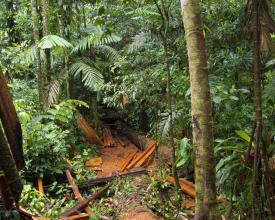DHA eNews - DHA Advocates To Stop Illegal Wood
Illegal logging threatens the world's forests and unfairly harms our DHA members who produce sustainably. That's why DHA joined others to advocate for vigorous enforcement of the Lacey Act to reduce illegal timber. DHA's approach to illegal timber includes our American National Standard for Due Diligence in Procuring/Sourcing Legal Timber, ANS LTDD 1.0 2015.
As imports from Russia decline, it is not clear if domestic producers will be able to increase supply to prevent shortages. One challenge may be the proposed listing of the northern long-eared bat as endangered. Previous proposals to list the bat would have drastically reduced timber harvests—even though the bat fares better in managed forests. DHA will work with other associations to comment on the proposal.
If you have questions or comments, contact me. I look forward to hearing from you.

Keith A. Christman, President
Decorative Hardwoods Association

Decorative Hardwoods Association and industry and environmental groups are advocating for increased enforcement of the Lacey Act to stop illegal logging, the world's third-largest transnational crime. Illegal logging generates between $52–157 billion per year at a steep cost: it threatens some of the world's most biologically diverse forests, contributes to climate change, and harms American manufacturers by undercutting them with illegal wood products.
On March 22, the U.S. Fish & Wildlife Service published a proposal to reclassify the northern long-eared bat as endangered under the Endangered Species Act. The bat faces extinction due to white-nose syndrome, a deadly disease affecting cave-dwelling bats across the continent.
The United Kingdom has announced additional import tariffs of 35% on Russian and Belarusian wood products. The initial list of goods affected by the increase, which came into effect on March 25, is worth nearly $1.2 billion.
The Russian log export ban and its war with Ukraine have wreaked havoc on the wood supply chain. Russia possesses 20% of the world’s trees but is now harvesting only 30% of its designated "production forests."
The trade of logs and lumber in Europe will change dramatically as Central European timber harvests decline and sanctions against Russia result in a sharp drop in imports of forest products, states Wood Resources International. Another important factor: the spruce bark beetle outbreak across Europe over the past four years resulted in increased harvesting.
Vietnam has set an aggressive target: to reach $20 billion in total timber exports by 2025, an increase of more than $9 billion. By 2030, Vietnam expects to reach a total export value of timber and forest products of $25 billion.
The lines of container ships waiting outside Chinese ports continue to grow as recent COVID-19 outbreaks threaten to cause yet another wave of shocks to global supply. China is experiencing its biggest spike in COVID-19 infections since the initial outbreak in Wuhan in 2020.
This year, the Decorative Hardwoods Association 2022 Spring Conference and 101st Annual Meeting will be held in downtown Nashville from Monday, May 16, to Wednesday, May 18. Experts will outline how the pandemic, war, tariffs, and illegal wood will continue to affect trade and trends; we'll also discuss the Real American Hardwood campaign. The conference kicks off with opportunities to connect with customers and your team over golf, a little whiskey, and good food and music.
Download your free copy of the Decorative Hardwoods Association Where to Buy Membership Directory to see what's new and to find reputable manufacturers and distributors of engineered wood flooring, veneer, and hardwood plywood—and the equipment and supplies needed to produce beautiful hardwood products.
The Canadian Hardwood Plywood and Veneer Association is changing its focus from updating and communicating quality standards and regulatory issues within the industry to promoting industry products to the trendsetters, architects, and designers who help people choose the look of their surroundings. CHPVA will use the tagline, "Wood is the solution."
A Brazilian court found three companies guilty of illegal logging in the Amazon. The companies were each fined $100,000 and ordered to plant approximately 25 acres of protected Brazil nut trees—the species they had illegally logged. One of the companies is Mil Madeiras, which has been in business for 20 years. The company's website claims that it "obtained certification from Brazilian environmental authorities."
Researchers estimate that deforestation in the central Purus River Basin and the state of Amazonas could clear 65,600 square miles of forest, an area larger than England, by 2050.
Nigeria has protected four reserves with the largest remaining tracts of forests in the country. Between 2002 and 2020, however, the Akure-Ofosu Forest Reserve lost 44% of its primary forest, as measured using satellite data from the University of Maryland, visualized on Global Forest Watch. Preliminary data indicate forest loss continued at a rapid pace in 2021.
U.S. Department of Agriculture published a three-page overview highlighting the benefits of carbon storage in national forests that directly links carbon storage to wood products. The publication outlines the major types of land use in the national forest system, including the amount of acreage "suitable for harvesting" and acreage set aside strictly for recreation.
In recent years, federal agencies that employ firefighters to suppress wildfires have struggled to hire enough personnel. In California, the number of firefighters working for the U.S. Forest Service plunged from 5,000 in 2019 to 3,956 in 2021, more than a 20% decline.
Beech trees from Ohio to Maine are dying from beech leaf disease, caused by a microscopic parasite. Scientists are scrambling for ways to control the pathogen and to find resistant trees that could be used to repopulate the species.
What is the best wood to use for marine-grade plywood?





